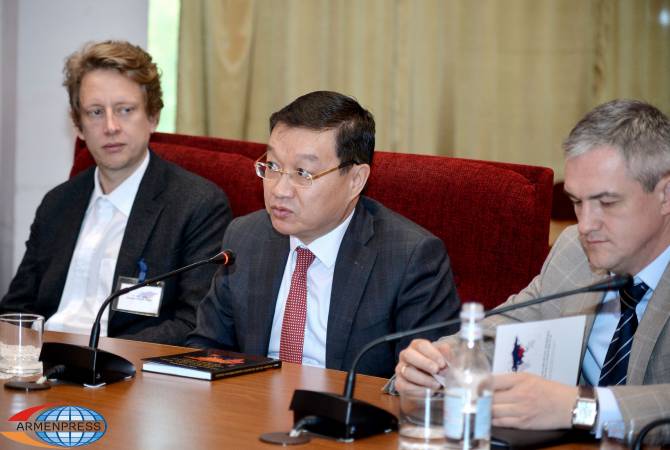EU Observer (29 October 2018)
Eurozone failures mean Iceland should stay out of the EU, its prime minister told EUobserver.
She would also quit Nato if she had her say.
"I don't think we should enter the EU right now. I don't think there is any reason to apply," Katrin Jakobsdottir said in an interview with this website, as Iceland's new government prepared to celebrate its first anniversary in power.
"Personally, I'm critical towards the economic policies of the EU - the creation of the eurozone without any real centralised policies on taxes or fiscal policies," she said.
"The European Central Bank has become really powerful without being very democratic. The economic policies of the EU have been really distant from people in the eurozone and they've created divisions that need not be there," she added.
Iceland applied to join the EU in 2009, but abandoned the process in 2015.
It has remained a member of the European Free Trade Association (EFTA) and the European Economic Area (EEA), two free-trade clubs, instead.
The North Atlantic country, with a tiny population of just 340,000 people, is also a member of Nato, the world's largest military alliance.
The issue of EU membership remained divisive, Jakobsdottir said.
"It was controversial then [in 2009] and still is," she said after recent polls, which indicated that 60 percent of Icelanders wanted to stay out of Europe, while 40 percent wanted to go in.
Free trade with the EU had been unequivocally good for Iceland, the eurosceptic prime minister said, however.
"Iceland's position within the EEA has proved beneficial to us," Jakobsdottir said.
"When we look at our economy, our social structure and our policy-making, I think that we've done pretty well without being members of the EU," the prime minister said.
"You can check all the indices of the world: We're not doing too badly on economic performance, social indicators, or gender equality for that matter, where we're ahead of all other Nordic countries," she added.
War games
The 42-year old Jakobsdottir, a former academic, became the second-ever woman to lead Iceland last year.
Her party, the Left-Green Movement, formed a coalition with the liberal Progressive and Independence parties to take power.
The government supports Nato membership, but the prime minister said she favoured "diplomatic and political" solutions to modern security challenges.
"My party's position is that we are against Iceland's membership of Nato. However, we're the only party in Iceland's parliament that holds that position," she said.
"We - as the Left-Green party - recognise that there is a strong majority in Iceland in support of our Nato membership, but we don't favour the idea of a permanent military presence here in Iceland," she added.
US troops kept Iceland free from German occupation in World War II.
Iceland also became a founding member of Nato in 1949, but the US quit its permanent base there in 2006.
Jakobsdottir spoke amid mass-scale Nato war-games - Trident Juncture - which began last week and which saw three Canadian and two British frigates as well as a US amphibious assault ship, the USS Iwo Jima, and 7,000 American soldiers come to Reykjavik.
The operation's focus is to defend Norway from a "fictitious aggressor" - Nato's veiled term for Russia.
But the straits between Greenland, Iceland, and the UK have received increased attention after Russia seized Crimea from Ukraine in 2014 and began a military build-up in the Baltic and Arctic regions.
US P-8 Poseidon aircraft, which hunt for Russian submarines, have also become frequent visitors at Iceland's Keflavik airport in recent years.
Diplomatic solutions
Jakobsdottir said she was "critical of any increased militarisation of the North Atlantic."
Her government would "stick to the security policy [Nato membership] that we've agreed upon", she said.
But "we [her party] favour more peaceful solutions and we don't think that increased militarisation is a solution," she added.
"We need to strengthen diplomatic and political relations. We will not give up that position even if there is trouble around us," she said.
No comments yet.
- BULGARIA 'SMASHES FAKE PASSPORT SCAM' The Balkans 30.10.2018
- ITALY’S DI MAIO WARNS AGAINST PARTY DIVISIONS AFTER TAP PIPELINE U-TURN Europe - EU 30.10.2018
- JAPAN, INDIA LEADERS AGREE TO STEP UP DEFENSE, ECONOMIC TIES Asia - Pacific 30.10.2018
-
 “CHINA-EURASIA” FIRST INTERNATIONAL CONFERENCE HELD IN YEREVAN, ARMENIA
The Caucasus and Turkish-Armenian Relations
30.10.2018
“CHINA-EURASIA” FIRST INTERNATIONAL CONFERENCE HELD IN YEREVAN, ARMENIA
The Caucasus and Turkish-Armenian Relations
30.10.2018
- 'NO THANKS!' TO EU AND NATO, ICELAND PM SAYS Europe - EU 30.10.2018
-
25.01.2016
THE ARMENIAN QUESTION - BASIC KNOWLEDGE AND DOCUMENTATION -
12.06.2024
THE TRUTH WILL OUT -
27.03.2023
RADİKAL ERMENİ UNSURLARCA GERÇEKLEŞTİRİLEN MEZALİMLER VE VANDALİZM -
17.03.2023
PATRIOTISM PERVERTED -
23.02.2023
MEN ARE LIKE THAT -
03.02.2023
BAKÜ-TİFLİS-CEYHAN BORU HATTININ YAŞANAN TARİHİ -
16.12.2022
INTERNATIONAL SCHOLARS ON THE EVENTS OF 1915 -
07.12.2022
FAKE PHOTOS AND THE ARMENIAN PROPAGANDA -
07.12.2022
ERMENİ PROPAGANDASI VE SAHTE RESİMLER -
01.01.2022
A Letter From Japan - Strategically Mum: The Silence of the Armenians -
01.01.2022
Japonya'dan Bir Mektup - Stratejik Suskunluk: Ermenilerin Sessizliği -
03.06.2020
Anastas Mikoyan: Confessions of an Armenian Bolshevik -
08.04.2020
Sovyet Sonrası Ukrayna’da Devlet, Toplum ve Siyaset - Değişen Dinamikler, Dönüşen Kimlikler -
12.06.2018
Ermeni Sorunuyla İlgili İngiliz Belgeleri (1912-1923) - British Documents on Armenian Question (1912-1923) -
02.12.2016
Turkish-Russian Academics: A Historical Study on the Caucasus -
01.07.2016
Gürcistan'daki Müslüman Topluluklar: Azınlık Hakları, Kimlik, Siyaset -
10.03.2016
Armenian Diaspora: Diaspora, State and the Imagination of the Republic of Armenia -
24.01.2016
ERMENİ SORUNU - TEMEL BİLGİ VE BELGELER (2. BASKI)
-
AVİM Conference Hall 24.01.2023
CONFERENCE TITLED “HUNGARY’S PERSPECTIVES ON THE TURKIC WORLD"









